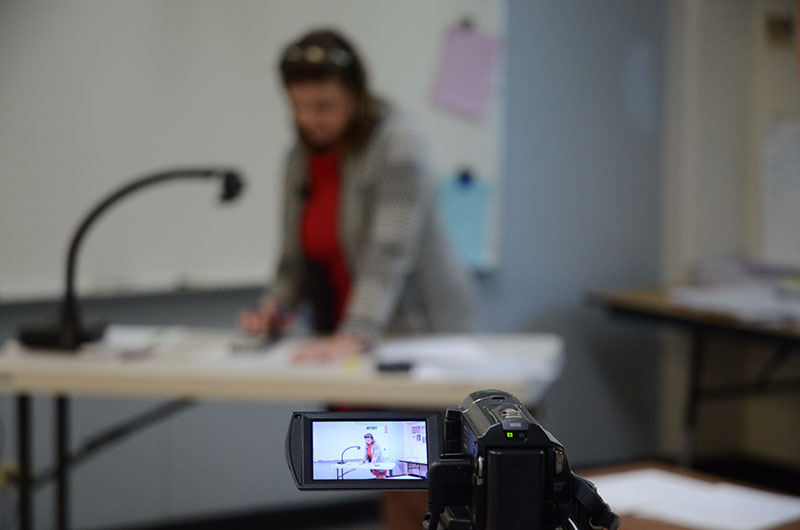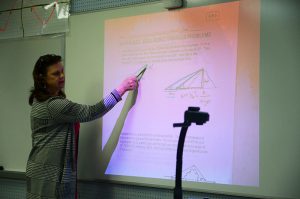
Creating a virtual calculus community, math teacher Joan Speer streams a lesson in Precalc for her FHS students sequestered at home. Photo by Phil Houseal
May 6, 2020–With a boost from technology, Joan Speer is making sure her high school students stay in a “calculus community.” That’s what the Fredericksburg High School (FHS) math teacher misses most about the current suspension of public schools due to The Virus Which Shall Not Be Named.
“I’ve taught this for 12 years, and there’s never been a year when a kid didn’t say, wait a minute, why not look at it this way,” Speer said of her AP Calculus AB class. “That’s why I tell them to get into a calculus community, because someone across from you will have a different approach. Not having kids in the room, they can’t learn from each other, they can’t bounce ideas around.”

Paige Findley offered the services of his video/marketing company 17Three to stream teaching lessons
One afternoon I popped into her classroom to observe while Paige Findley livestreamed Speer teaching a Pre-AP Pre-Calc lesson. Findley has offered the services of his video/marketing company 17Three to teachers wanting to stream and archive lessons for students now learning from their living rooms.
For Speer, to say teaching via video is an adjustment is an understatement.
“It’s really difficult, because what makes teaching so interesting is facing the students,” she said. “It’s so rare to sit up there and just lecture.”
Part of the challenge is lack of real-time feedback. Any teacher quickly learns to “read the room,” recognizing quizzical looks, restlessness, and other non-verbal signs that students are just not catching on.
She also likes to break up her “in class” lessons with a fun math challenge, or even have the students get up and move around.
“Because if I like this and I’m bored, imagine if you’re 15 years old! Hey, this is great… teach us more stuff we don’t want to know!”
 But Speer is aware of some benefits that come with this new model of instruction. She is building a library of virtual lessons that will be archived, becoming a rich resource kids can turn to in future school years.
But Speer is aware of some benefits that come with this new model of instruction. She is building a library of virtual lessons that will be archived, becoming a rich resource kids can turn to in future school years.
The district is using several online resources in order to reach out to home-bound families. One is Edgenuity, an app that offers online lessons, with short videos of a teacher covering each lesson.
“It’s been a godsend to have it,” said Sarah Southard, FHS Assistant Principal. “We acquired the site license back in August, not knowing we would be involved in this pandemic. It’s allowed teachers to stay in line with state standards and to keep kids on track.”
Like every school facing this unprecedented situation, Fredericksburg ISD is adjusting.
“I can say with certainty we all miss the norm,” Southard said. “We miss the kids. We miss our daily schedule. But our teachers have stepped up, going out of their way to accommodate students.”
There might even be silver linings.
“We’ve probably made more phone calls to parents and students in the last couple of months than ever,” she said. “That’s a good thing. You can never go wrong communicating with the family. We hope we keep that up, even when we return to our regular schedule.”
Speer also acknowledges outcomes beyond functions and slopes of curves.
“Long term, we are finding new ways to reach out to students online,” she said. “That means we’ll be more prepared to help when students are out for months. We can use these tools to get our lessons out there, and we’ll all be more familiar with the technology.”
And a change in student attitude might be part of the equation.
“Students aren’t going to take school as lightly as they might have before,” Speer said. “They have learned that they value their friends, they value their relationships, and, yes, they actually value their teachers! We all have bad days. But kids are realizing this experience can be gone at any second, and, for them, it was.”
Speer stood up to record her next lesson.
“They won’t be as quick to say, meh, I’m going to skip today. Because now they don’t know if they are going to have tomorrow anymore. Can you imagine our children thinking that?”